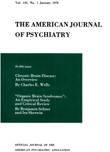DISABILITY EVALUATION OF HALLUCINATIONS IN PSYCHIATRIC ILLNESS
Abstract
Capacity to function in a work setting is the crucial issue in the evaluation of the existence of a disability resulting from a psychiatric illness. The diagnosis is not sufficient unless accompanied by clinical findings establishing substantial and persistent loss of function. The evaluation of hallucinations as a part of psychiatric illness may be a particular source of difficulty. Transient episodes of hallucinations may not, in themselves, establish substantial and persistent loss of functional capacity for work. The elicitation of evidence of hallucinations in a clinical setting is somewhat complicated by the fact that a large segment of the population has been exposed to psychiatric nomenclature and procedures. The basic issue is to establish clinically that the hallucinatory phenomena significantly impair the predictability and effectiveness of the patient's vocational adjustment.
Access content
To read the fulltext, please use one of the options below to sign in or purchase access.- Personal login
- Institutional Login
- Sign in via OpenAthens
- Register for access
-
Please login/register if you wish to pair your device and check access availability.
Not a subscriber?
PsychiatryOnline subscription options offer access to the DSM-5 library, books, journals, CME, and patient resources. This all-in-one virtual library provides psychiatrists and mental health professionals with key resources for diagnosis, treatment, research, and professional development.
Need more help? PsychiatryOnline Customer Service may be reached by emailing [email protected] or by calling 800-368-5777 (in the U.S.) or 703-907-7322 (outside the U.S.).



